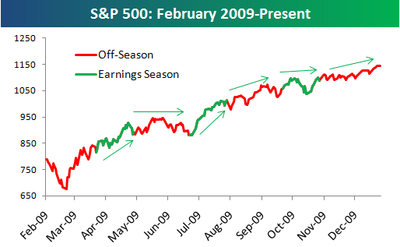Thoughts from John Mauldin:
The Great Experiment
So this is the backdrop as we look into the future. Unemployment is rising and is likely to remain stubbornly high (over 10%) for some time, except for the few months this coming summer when the Labor Department will hire hundreds of thousands of temporary census workers. The savings rate is rising, and consumer spending is at the very least challenged. The stimulus starts to drop sharply in the latter half of the year. States, counties, and cities are short about $260 billion and will either have to cut services (and thus jobs) or increase taxes. Housing is likely to get weaker, as there are large numbers of defaults coming because of mortgage-rate resets this year and next (more on that in a few weeks). Valuations on stocks are in the high range, and do not portend well for long-term returns.
Further - and this is the most important item to me - Congress is likely to allow the Bush tax cuts to expire and to add insult to injury with some form of large tax increase for heath care. Between the local, state, and federal tax increases, we could see a massive increase in taxes of perhaps $500 billion in a $13-trillion economy, or about 4% of GDP.
Think about that for a moment. It is likely we will begin 2011 with close to 10% unemployment, if not higher. Christina Romer's work shows that tax cuts have a three-times benefit to GDP. Tax increases presumably have a similar negative effect. (Ms. Romer, by the way, is President Obama's Chairwoman of the Council of Economic Advisors. This is not a partisan idea.)
This is the great experiment to which we are going to be subjected. There are those who agree with Art Laffer and company that tax cuts are a positive for the economy (that would include your humble analyst). And there are those who contend that the economy did just fine in the Clinton years before the Bush tax cuts and that we will do just as well if we take them away. And further, taxing the rich a little more is not really going to change their behavior.
My contention is that if such a tax increase is enacted all at once, the economy will at a minimum dip back into a nasty recession. If I am wrong, then I will have to abandon one of my long-cherished beliefs. I will have to stop arguing that tax cuts are as important as I think. Right now, when I read the data and studies, they confirm my tax-cutting bias. But I have to be willing to change my mind if The Great Experiment proves me wrong.
But if you think unemployment is high now, you will really not like what happens if we dip back into recession. It could go a lot higher. They are truly risking a great deal if they decide to pursue this experiment.
Thus, I am faced with a great deal of uncertainty as I look into the future with my forecasts - and we will get into the bulk of the actual forecasts next week. I almost titled this letter "The Year of Waiting," because there are so many important developments we are waiting on. Will they actually raise taxes in such a soft economy, or will cooler heads prevail and the increases be postponed, or at least phased in over 4-5 years? What will the health-care bill look like? There are so many things that could significantly change any predictions.
As I have written for years, the stock market drops an average of over 40% during a recession. If we go into a recession in 2011, it is highly unlikely that there will be an exception to the bear market rule. But this market seemingly wants to go higher. Smart people like my partner Steve Blumenthal argue with me that the technicals say we could go a lot higher in the short term. And he may very well be (and probably is) right.
This is a trader's market. It is not time to buy and hold large indexes or high-beta stocks and expect to be made whole over the next ten years. Hope is not a strategy. But waiting for the "shoe to drop" is frustrating, I know. However, that is the situation we find ourselves in.
The current environment is quite different than 1982, when the last bull market started. Rates were falling; they are now likely to rise over time. Taxes were going down. Valuations were at historical lows, not high and rising. Inflation was coming down. And on and on. The current environment is not one in which bull markets are born.
























